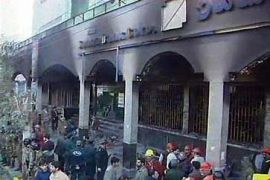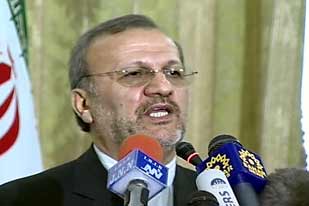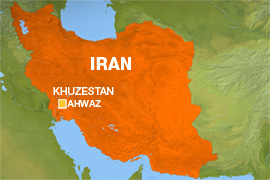Iran Arabs denounce discrimination
Iranian Arab activists accuse government of treating them as second-class citizens.

 |
| The Iranian government accused Britain of involvement in the Ahwaz bombings in 2006 |
Iranian Arabs in the oil-rich province of Khuzestan in southwest Iran have expressed a strong will to split from Iran and restore their own state, accusing Tehran of suppressing them racially, economically, and politically.
Ahwaz has been witnessing sporadic bombings and confrontations between residents and Iranian police.
In 2006, a bomb exploded in the city, causing tension between Britain and Iran after Manouchechr Mottaki, the Iranian foreign minister, accused Britain of involvement in the unrest.
Arab activists have complained about Iranian indifference to their demands and calls for dialogue.
They have voiced concerns over the low living standards, and the lack of education and medical services in their community.
Tahir Aal Sayyed Nima, chairman of the Ahwaz National Liberation Movement (ANLM), told Al Jazeera.net that Iran was treating its Arab nationals as second-class citizens.
He said: “Arabic is banned in government departments and parliament. Arabic is not allowed to be taught at schools or learning centres. We see this as a bid to assassinate our Arab identity.
“Schools are not available in villages, peasants’ children have to go to the city on daily basis to be able to study, which is very impractical of course. Hence, illiteracy in Ahwaz is estimated at 90 per cent, and as long as the Iranian government blocks education, it is unlikely that this percentage would ever go down.”
Illiteracy in Iran in general is estimated at 33 per cent.
Federalism
Most of Ahwazi political movements demand full independence for their region, but the Democratic Solidarity Party of al-Ahwaz (DSPA) demands self-rule within a federal state.
Mansour al-Ahwazi, a spokesman for the DSPA, told Al Jazeera.net: “We think it is closer to logic for the time being if we ask for self-rule within a federal state, provided that we enjoy the right of self-determination.
“We have come to the conclusion that the current Iranian regime cannot be reformed, and that is why the reformists have failed to achieve something.
“Our party along with 15 Iranian opposition organisations, have formed the Congress of Iranian Nationalities for Federal Iran. It includes all ethnicities in Iran, and we hope that its outcome will be the appropriate replacement for current regime.”
Discrimination
Despite the difference in their approaches, Nima and al-Ahwazi are united in their belief that Ahwazi Arabs are discriminated against by the Iranian government.
Nima said: “An Arab cannot have a job even in his own region. Government departments in our region are full of Persian Iranians. It is nearly impossible for an Arab to get a job at a government department in Ahwaz. How can we get jobs when the Persians call us Kwawla, meaning Gypsies?”
He continued: “Iranians have established agricultural settlements just like those in Israel. By doing this, they are filling the region with Persians and eventually they will achieve their strategic goal of changing the area’s demography and make the Persians a majority.”
Iran has launched several big projects in the Ahwaz region, such as the Sheeren Shah settlement and the Sheelat settlement, for the fishing industry.
 |
| Khuzestan is an oil-rich region |
Abd Allah al-Nafisi, a Kuwaiti political analyst and author, told Al Jazeera that the Ahwaz region was vital to Iran’s economy. But it is also inhabited by non-Persians, which makes it tricky for Tehran to strike a balance between economic interests and national security.
“Ahwaz is an oil-rich province, so it would be a fundamental region to the government, but at the same time it is inhabited by Arabs. Moreover, geographically it is adjacent to Iraq and Kuwait and stretches along the west shore of the Gulf.
“For the sake of argument, if this region is granted independence or even a self-rule, it would form with Iraq and the Arab states of the Gulf a huge Arab bloc at the gates of Iran,” he said.
Constitution
The Iranian constitution states that non-Persian Iranian communities should enjoy the right to preserve their ethnic and religious identities, along with citizenship rights.
Persians constitute 51 per cent of Iran’s population of 69 million people. Iran says its Arab population is about two million, but Ahwazis dispute that and say their community has at least five million.
Said Al-Ahwazi: “The Iranian constitution touches on non-Persians’ rights, but not clearly and directly. However, we would stick to what we have now.
“We have a problem with the government which is still in a state of denial about its own constitution. If the constitution were implemented fairly, at least we would have been able to teach our language to our children and we would have been able to get jobs.”
He said that the first to ask the government to abide by the constitution and give Arabs and other non-Persian Iranians their rights, was a former member of parliament, Jassim al-Tamimi, of the Ahwazi Accordance party.
But the Iranian parliament considered al-Tamimi’s requests as a threat to Iranian national security, and banned him from running for the 2005 parliamentary elections.
He was also imprisoned for a week during the Ahwazi uprising in April 2005.
Al Jazeera contacted al-Tamimi at his house in Iran, but his family said he was out of Iran and refused to reveal his whereabouts or give any contact details.
Al Jazeera also contacted the Iranian government for its comments, but no Iranian official was forthcoming.